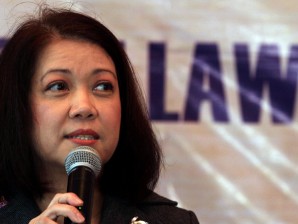This time, it was Chief Justice Ma. Lourdes Sereno who skipped the regular Monday flag-raising ceremony at the Supreme Court.
Sereno chose instead to attend the flag rites at Philippine National Police (PNP) headquarters at Camp Crame, Quezon City, where the PNP Legal Service was celebrating its 20th anniversary.
Sereno’s absence was explained by court officials before the ceremony at the Supreme Court began at 8:30 a.m. And for the first time, the officials also explained why some justices, like perennial absentee Associate Justice Antonio Carpio, were not around Monday.
Carpio and Associate Justice Mariano del Castillo were on “wellness leaves” while Associate Justice Jose Perez was on leave as well, the officials said.
Associate Justice Bienvenido Reyes, on the other hand, was abroad.
Only five justices attended the ceremony—Roberto Abad, Estela Perlas-Bernabe, Jose Mendoza, Presbitero Velasco and Martin Villarama.
Over at Camp Crame, Sereno lauded the PNP leadership for implementing reforms in the service to expedite the resolution of court cases.
“I’m very much heartened that your transformation program’s overall reform objective is for the entire criminal justice system to be able to provide speedy, impartial and accessible justice,” the Chief Justice said.
She also cited the PNP’s programs aimed at improving law and order in the country and the “delivery of… public safety services within the context of an improved public trust and confidence in our criminal justice system.”
“As part of the justice system myself, it is very encouraging to see these objectives, which are parallel to our own adjudicatory intentions, being instituted… by you, the main (law) enforcement arm of the government,” Sereno said.
In her speech, she listed the judicial reforms she had started since assuming office in August, such as the “rule on judicial affidavits.”
She said the new court rule, to be implemented early next year, “will allow the direct testimonies of police witnesses to be taken by way of affidavits.”
This means that policemen who have to testify in court cases need not be physically present at the hearings, she said.
“We understand that every unnecessary hearing and every unnecessary postponement of a hearing involving the testimony of a police-witness gives more time for criminals to terrorize our streets and less time for policemen to prepare and arrest them,” she said.
The rule, however, would only apply to the direct testimonies of the police-witnesses, she said. “The police-witnesses will still have to be present if the defense wishes to cross examine (them).”
“Some of the other reforms that we will implement will be in the same manner as the judicial affidavit rule to expedite trials so that the testimonies of witnesses need not go stale,” she said.
